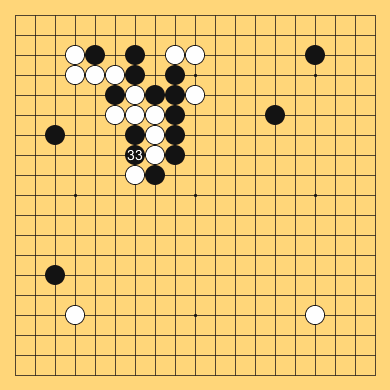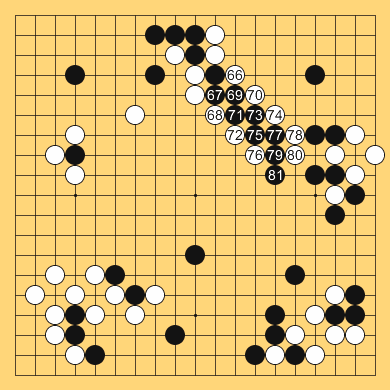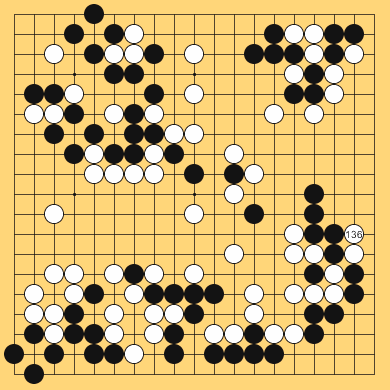
| format | 7-round Swiss |
|---|---|
| board size | 19×19 |
| rules | Chinese |
| komi | 7½ |
| time | Eight hours each, sudden death |
The first round started at 22:00 UTC on the evening of Sunday 20th.
| |||||||||||||||||||||||||||||||||||||||||||||||||||||||||||||||||||||||||||||||||||||||||||||||||||||||||||||||||||||||||||||||||||||
|
In the table above, | |||||||||||||||||||||||||||||||||||||||||||||||||||||||||||||||||||||||||||||||||||||||||||||||||||||||||||||||||||||||||||||||||||||
Eight players registered, and all played all their games.

|
|---|
| gomorra3 vs valkyria19 |
| Moves 16-17. |
In round 1, after playing move 51, CzechBot encountered some problem which prevented it from making any more moves; its opponent Orego12 won on time.
Also in round 3, gomorra3 got off to a good start in its game with valkyria19, as shown to the right. Move 16 is not bad, White can't save the three stones; but a move in the upper right corner instead would at least threaten to save them. Despite this good start, valkyria19 went on to win the game.
During the time scheduled for round 1, but after all the games were over, KGS went down for about two hours. When it came back up, six of the contestants reconnected, but Orego12 and StoneGrid were missing.
In round 2, StoneGrid reconnected and satrted playing about 80 minutes late; also Orego12, about two hours late. CzechBot played at a reasonable speed for moves 1 to 49, making each move in betwen three and four minutes; but half an hour passed without its making move 51, so its operator assumed it had gone to sleep, and woke it up again.

|
|---|
| ManyFaces1 vs pachi2 |
| Moves 90-91. |
In round 3, there was an exciting game between pachi2 and ManyFaces1. [I no longer give in-context links to games, as they are all linked to from the cross-table at the top of the page]. Move 90 by ManyFaces1, shown to the left, may have been the losing move, as it allowed pachi2 to capture a significant group, as shown to the left. After this game, pachi2 was the only player on three wins.

|
|---|
| PNUGo vs ManyFaces1 |
| Move 15. |
At the start of round 4, PNUGo was missing. I telephoned its operator, and reminded him to start it. It joined the room, and some time later joined its game with Manyfaces1, almost 40 minutes late.
In this game, ManyFaces1 played move 15 as shown to the right. This can't be as good as the other high approach to the hoshi stone, at d6. Most of the board is symmetrical; the only non-symmetry is in the upper right, where there is a ladder that would be broken by d6 but not by f4. Yet ManyFaces1 played f4. I assume that though ManyFaces1's methods allow it to understand ladders, they provide no understanding of ladder-breakers.

|
|---|
| CzechBot vs pachi2 |
| Move 33. |
Also in round 4, pachi2 made a move which is hard to understand, shown to the left.

|
|---|
| StoneGrid vs valkyria19 |
| Moves 66-81 |
Still in round 4, StoneGrid chased valkyria19's stones unsuccessfully in a ladder, as seen to the right.
In round 5 ManyFaces1 and CzechBot played the longest game of the tournament, CzechBot resigning after 13 hours and 24 minutes.

|
|---|
| pachi2 vs ManyFaces1 |
| Move 136. |
In round 6, pachi2 and ManyFaces1 played each other again. Thanks to a recent change in the KGS tournament scheduler, they played with the colours reversed releative to their round 3 game. ManyFaces1, as Black, secured all four corners, allowing pachi2 large central territory. However this central territory proved even leakier than it looked, and ManyFaces1 won the game.
A move that surprised me in this game is 136 by pachi2, shown to the left. If answered in the obvious way (as it was) this is a clear loss for White. My first thought was that pachi2 thought it had little chance of winning, and was making a strongly forcing move as a way of postponing the bad news; pachi and some other MC-based bots are inclined to do that, as mentioned in my previous report, round 13, EricaBot vs pachi2. But the move shown is not even strongly forcing. I am puzzled.

|
|---|
| CzechBot vs valkyria19 |
| At point where White resigned. |
Also in round 6, CzechBot and valkyria19 both ignored semeais which a kyu-rated player can understand easily. There was a more complicated one earlier in the game; and towards the end of the game, the semeai shown to the right remained on the board for many moves, with both players ignoring it. The two groups which touch the top edge of the board can each be captured in three moves, and can't both live; a move to win this semeai is worth about 90 points.
After round 6 ManyFaces1 and pachi2 were tied for first place, on five wins each. The draw for round 7 was such that, if they both won their games, they would end up tied on wins, SOS, and SoDOS. This was indeed what happened.
I now consider that eight hours each is too slow. The players generally took less than half their allocated time. Also, the requirement to run their systems for so long deterred Zen and Erica from competing, which was a pity.
I shall not run a tournament as slow as this again. Indeed, I think that six hours each is also too long. I shall adjust the schedule for future Slow tournaments, making the time limits shorter.
The players receive points for the 2011 Annual KGS Bot Championship as follows:
| Many Faces of Go | 6½ |
| pachi | 6½ |
| MoGo | 3 |
| StoneGrid | 2 |
| valkyria19 | 1 |